Branford Clarke
| Branford Edward Clarke | |
|---|---|
 Clarke's traveling chapel | |
| Born |
March 18, 1885 London, England |
| Died |
July 7, 1947 (aged 62) Somerset, New Jersey |
| Occupation | Minister, poet and artist |
| Employer | Pillar of Fire Church |
| Spouse(s) | Esther May Clarke (1896–1988) |
| Children | Branford Clarke, Jr. (1920–2003) |


Branford Edward Clarke (March 18, 1885 – July 7, 1947) was an Evangelical preacher, poet and artist who promoted the Ku Klux Klan through his art which was drawn for the Pillar of Fire Church and their publications.[1][2][3]
Biography
He was born on March 18, 1885 in London, England. His brother was a Member of Parliament.[4] In the 1920s he converted a Model T into a mobile chapel.[5][6][7][8] He was pastor of the Pillar of Fire Church in Brooklyn, New York for at least several years. From about 1925 to 1928 he illustrated numerous religious and political publications for the Pillar of Fire Church in partnership with Bishop Alma White, the church's founder and leader. Many of his illustrations supported Bishop White's writings by attacking various minorities including Catholics, Jews, and US immigrants and by promoting the Ku Klux Klan.
He died on July 7, 1947 and was buried in the Pillar of Fire cemetery in Zarephath, New Jersey. His epitaph reads "The Cross he bore, through years of service bound, on yonder shore in recompense is found, The Crown."
Artwork
Books
- Poems and Pictures by a Preacher (1921) [9]
- The Ku Klux Klan In Prophecy (1925)
- Klansmen: Guardians of Liberty (1926)
- Heroes of the Fiery Cross (1928)[10]
- Woman's Chains (1943): 9 illustrations
- Guardians of Liberty Vol I-III, (1943)
Periodicals
- The Good Citizen (1913–1933)
Hymns
Several of Clarke's poems were set to music by his wife Esther and published as hymns in the Pillar of Fire's Cross and Crown Hymnal. Some of Branford Clarke's hymns include: Tell Me of the Love of Jesus, Everything Will Work Out Right, God Keep Me Strong, Prayer Changes Things, Calling Again and Again, Take Heart, and Yonder Shore.
Yonder Shore
Life may have clouds, but when I think of Jesus
The sun breaks thro' its radiance to outpour
And far away I hear the song of angels
Singing, singing, singing on yonder shore.
There is a cross that every one must carry
Long a thorned path whose toils will soon be o'er
Then at His feet shall we lay down our burdens
With the fair immortals on yonder shore.
While trav'ling on to that eternal haven
Here in the heart can be fair Canaan's door
Thro' which the love of Jesus softly stealing
Fills the soul with glory from yonder shore.
There is a death, but it is only mortal
The soul lives on and on for evermore.
How wonderful to dwell for aye with Jesus
Ever and forever on yonder shore.
Chorus
Singing on that shore
Singing on that shore
Hark, I hear them singing
Singing, ever, singing on yonder shore.
Images
 From Heroes of the Fiery Cross 1928.
From Heroes of the Fiery Cross 1928. From Heroes of the Fiery Cross 1928.
From Heroes of the Fiery Cross 1928. From Heroes of the Fiery Cross 1928.
From Heroes of the Fiery Cross 1928. From Heroes of the Fiery Cross 1928.
From Heroes of the Fiery Cross 1928.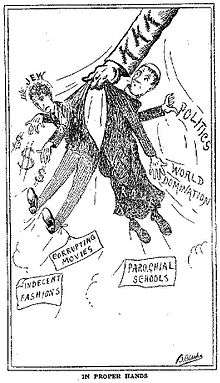 From Heroes of the Fiery Cross 1928.
From Heroes of the Fiery Cross 1928. From Heroes of the Fiery Cross 1928.
From Heroes of the Fiery Cross 1928. From Heroes of the Fiery Cross 1928.
From Heroes of the Fiery Cross 1928. Out of the Smoke Un-Americanism. From Heroes of the Fiery Cross 1928.
Out of the Smoke Un-Americanism. From Heroes of the Fiery Cross 1928. Ringing The Liberty Bell. From Klansmen: Guardians of Liberty 1926.
Ringing The Liberty Bell. From Klansmen: Guardians of Liberty 1926. Protecting Hand of True Americanism. From Klansmen: Guardians of Liberty 1926.
Protecting Hand of True Americanism. From Klansmen: Guardians of Liberty 1926. The Subtle Conspirator. from Klansmen: Guardians of Liberty
The Subtle Conspirator. from Klansmen: Guardians of Liberty Eating In. from Klansmen: Guardians of Liberty
Eating In. from Klansmen: Guardians of Liberty Who Has Been Into That Jam? Branford Clarke illustration in Klansmen: Guardians of Liberty
Who Has Been Into That Jam? Branford Clarke illustration in Klansmen: Guardians of Liberty A Come-Back He Was Not Expecting. from Klansmen: Guardians of Liberty
A Come-Back He Was Not Expecting. from Klansmen: Guardians of Liberty The Defender Of The 18th Amendment. from Klansmen: Guardians of Liberty 1926.
The Defender Of The 18th Amendment. from Klansmen: Guardians of Liberty 1926. Push Him Off. from Klansmen: Guardians of Liberty 1926.
Push Him Off. from Klansmen: Guardians of Liberty 1926.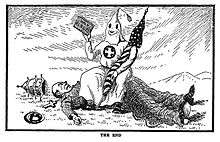 The End. from Klansmen: Guardians of Liberty
The End. from Klansmen: Guardians of Liberty The Protecting Hand Of True Americanism. from Klansmen: Guardians of Liberty
The Protecting Hand Of True Americanism. from Klansmen: Guardians of Liberty Rome's Prison Houses Must be Opened For Inspection. from Klansmen: Guardians of Liberty
Rome's Prison Houses Must be Opened For Inspection. from Klansmen: Guardians of Liberty The Bible Must Be Placed In Every Schoolroom. from Klansmen: Guardians of Liberty
The Bible Must Be Placed In Every Schoolroom. from Klansmen: Guardians of Liberty Watch Your Step. from Klansmen: Guardians of Liberty
Watch Your Step. from Klansmen: Guardians of Liberty Which Will You Choose? from Klansmen: Guardians of Liberty
Which Will You Choose? from Klansmen: Guardians of Liberty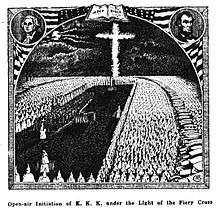 Open-air Initiation of K.K.K. under the Light of the Fiery Cross. From The Ku Klux Klan In Prophecy 1925.
Open-air Initiation of K.K.K. under the Light of the Fiery Cross. From The Ku Klux Klan In Prophecy 1925.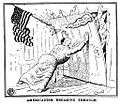 Americanism Breaking Through. From The Ku Klux Klan In Prophecy 1925.
Americanism Breaking Through. From The Ku Klux Klan In Prophecy 1925. A New Star Baffles Rome. From The Ku Klux Klan In Prophecy 1925.
A New Star Baffles Rome. From The Ku Klux Klan In Prophecy 1925. This Great Army for Truth and Americanism Makes Rome Tremble. From The Ku Klux Klan In Prophecy 1925.
This Great Army for Truth and Americanism Makes Rome Tremble. From The Ku Klux Klan In Prophecy 1925. The Coming Conflict. From The Ku Klux Klan In Prophecy 1925.
The Coming Conflict. From The Ku Klux Klan In Prophecy 1925. The Scarlet Woman on the Back of the Beast. From The Ku Klux Klan In Prophecy 1925.
The Scarlet Woman on the Back of the Beast. From The Ku Klux Klan In Prophecy 1925. The Rising Sun Will Melt The Snow Man. From The Ku Klux Klan In Prophecy 1925.
The Rising Sun Will Melt The Snow Man. From The Ku Klux Klan In Prophecy 1925. The Men Who Are Refusing to Bow to the Great Image. From The Ku Klux Klan In Prophecy 1925.
The Men Who Are Refusing to Bow to the Great Image. From The Ku Klux Klan In Prophecy 1925. The Good Samaritan (K.K.K.) Caring For The Man Who Was Wounded, While His Persecutors Flee. From The Ku Klux Klan In Prophecy 1925.
The Good Samaritan (K.K.K.) Caring For The Man Who Was Wounded, While His Persecutors Flee. From The Ku Klux Klan In Prophecy 1925. The Ballot Will Bring The Walls Down. From The Ku Klux Klan In Prophecy 1925.
The Ballot Will Bring The Walls Down. From The Ku Klux Klan In Prophecy 1925.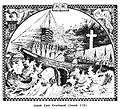 Jonah Cast Overboard. From The Ku Klux Klan In Prophecy 1925.
Jonah Cast Overboard. From The Ku Klux Klan In Prophecy 1925.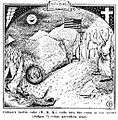 Gideon's barley cake (K.K.K.) rolls into the camp of the enemy. From The Ku Klux Klan In Prophecy 1925.
Gideon's barley cake (K.K.K.) rolls into the camp of the enemy. From The Ku Klux Klan In Prophecy 1925. The White-robed Army—the Protectors of Americanism. From The Ku Klux Klan In Prophecy 1925.
The White-robed Army—the Protectors of Americanism. From The Ku Klux Klan In Prophecy 1925. And the Star Spangled Banner in triumph shall wave, O'er the land of the free, spite of Rome and the Knave. From The Ku Klux Klan In Prophecy 1925.
And the Star Spangled Banner in triumph shall wave, O'er the land of the free, spite of Rome and the Knave. From The Ku Klux Klan In Prophecy 1925. Behold the mountain was full of horses and chariots of fire round about Elisha. From The Ku Klux Klan In Prophecy 1925.
Behold the mountain was full of horses and chariots of fire round about Elisha. From The Ku Klux Klan In Prophecy 1925. The Defenders of the Public School. From The Ku Klux Klan In Prophecy 1925.
The Defenders of the Public School. From The Ku Klux Klan In Prophecy 1925. St. Patrick's Day in America From Klansmen: Guardians of Liberty 1927.
St. Patrick's Day in America From Klansmen: Guardians of Liberty 1927.
References
- ↑ Lynn S. Neal (June 1, 2009). "Christianizing the Klan: Alma White, Branford Clarke, and the Art of Religious Intolerance". Church History. American Society of Church History. doi:10.1017/S0009640709000523.
White’s words and Clarke’s imagery combined in various ways to create a persuasive and powerful message of religious intolerance. ...
- ↑ "Branford Clarke". James Pearsall. Retrieved 2009-04-29.
... Rev. Branford Clarke, born in England ca. 1890, died in NJ ca. 1950. Clarke spent many years as pastor of the Pillar of Fire Church, Sterling Place, Brooklyn. He was a notable artist, illustrator and poet. Who were his antecedents in the UK? Any help will be appreciated. Thank you.
- ↑ Susie Cunningham Stanley (1993). Feminist Pillar of Fire: The Life of Alma White. The Pilgrim Press. ISBN 0-8298-0950-3.
Drawings by Pillar of Fire member Branford Clarke illustrated the periodical. Predominantly political in content, Clarke's sketches encouraged women to vote ...
- ↑ Gertrude Metlen Wolfram (1954). The widow of Zarephath. Pillar of Fire Church.
When he told his family of his determination to give up his career and go to America to become a minister in the Pillar of Fire, they were dismayed. He must be overworked. His brother was about to become a Member of Parliament; Branford's decision did not fit into the plans of so prominent a family. But he persisted until his father allowed him to come to America and Zarephath. Brother Clarke became an enthusiastic worker. Early in his career he and another young man held open-air meetings along Broadway and the nearby cross streets
- ↑ George W. Green (2003). Special use vehicles. McFarland. ISBN 0-7864-1245-3.
Branford Clarke with the Model T Mobile Chapel (Collections of Henry Ford Museum and Greenfield Village).
- ↑ "Chapel". Retrieved 2009-04-29.
The Reverend Branford Clarke's Brooklyn-based "traveling chapel" was equipped with stained-glass windows, an organ for his wife to play, and a fold-down steeple to help the whole thing fit in his garage.
- ↑ James Hale (2006). The Wonderful Wacky World of Marketing mobiles. Veloce Publishing. ISBN 1-84584-003-8.
By 1945 Ford cars have been put to many interesting uses, but this tiny travelling chapel of the Rev Branford Clarke, New York, is in a class of its own
- ↑ The Vintage Ford. 1989.
Branford Clarke, New York, is in a class by itself. Equipped with steeple 'n everything, Rev. Mr. Clarke is prepared to take the Scripture literally and ...
- ↑ Branford Clarke (1921). Poems and Pictures by a Preacher. The Kingston Printing Company.
This book is the product of years of experience of this poet, artist, preacher. It marks a new departure in book making.
- ↑ Catalog of Copyright Entries. Library of Congress. Retrieved 2009-04-29.
Further reading
- Christianizing the Klan: Alma White, Branford Clarke, and the Art of Religious Intolerance June 2009 by Lynn S. Neal Church History June 2009
External links
- "Branford Clarke". Find a Grave. Retrieved August 12, 2010.
- Branford Clarke at Flickr
| Wikimedia Commons has media related to Branford Clarke. |